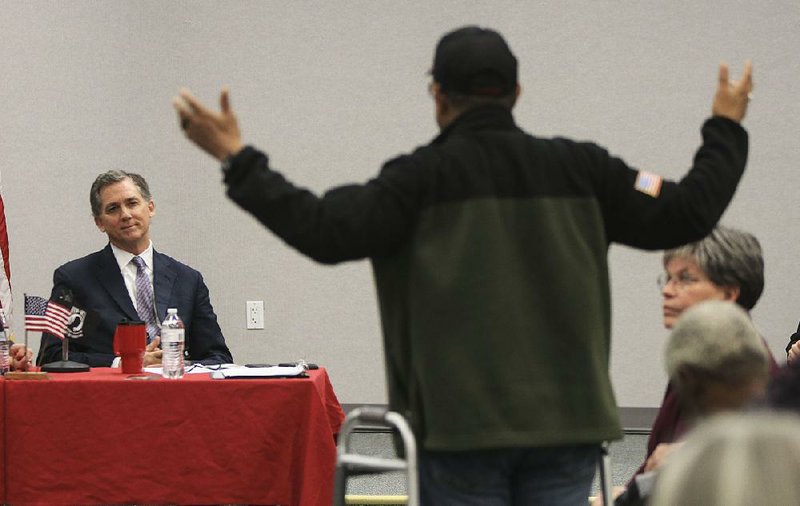The town hall-style meeting sprawled from contentious to off-topic, but afterward, most veterans gathered at the Little Rock veterans hospital on Monday were glad the chairman of the U.S. House Committee on Veterans Affairs heard their concerns.
U.S. Rep. Phil Roe, R-Tenn., who chairs the House panel, joined U.S. Rep. French Hill, R-Ark., at the John L. McClellan Memorial Veterans Hospital for one of Hill's Veterans Advisory Council meetings.
The Tennessee Republican, in an interview, said he too was glad to hear from Arkansas' former military members, adding that he plans to take some of their insights back with him to Washington.
Roe used the event to update Arkansans on recently passed and pending legislation that focuses on decentralizing veterans' health care. Roe sees the U.S. Department of Veterans Affairs' focus shifting even more toward community-based outpatient services and telemedicine.
"The way health care is provided is changing," Roe, a medical doctor himself, said. "So [the VA] has to change with it."
About 100 people attended the meeting. A question-and-answer session comprised most of the event. The congressmen were joined at the front by local VA leaders.
The wide-ranging discussion covered mental health, opioid addiction, access to care, benefits claims, appeals, homelessness and access to education.
Roe lauded several positive comments after the meeting, including an issue Don Berry, a retired Air Force colonel from Sherwood, brought to the chairman's attention.
Berry explained that the VA has introduced several successful initiatives funded by grants, but those initiatives have disappeared once the grants expire.
"There's no way to institutionalize successful programs," Berry told the congressmen.
Roe said he'd take Berry's insight back to Washington.
"If this grant works, is it scalable? Can we make it nationwide?" Roe said. "That's something I'll take with me."
Retired Col. Mike Ross, another local veteran who served in the Arkansas National Guard, pointed out that many Gulf War-era veterans are missing out on earned benefits because their primary-care physicians aren't recording symptoms associated with "chronic multisymptom illness," which the VA considers a "presumptive," meaning veterans exhibiting certain symptoms are automatically assumed to have developed those ailments from their military service.
Roe said there needs to be increased education of primary-care doctors to ensure factors that could come into play when veterans submit a VA claim are recorded.
Similarly, Roe highlighted recently introduced legislation that would extend benefits associated with Agent Orange exposure to Vietnam War veterans who were stationed in Thailand. The bill, introduced by U.S. Sen. John Boozman, R-Ark., earlier this month, would remove "arbitrary" limits in the VA's current policy.
In fiscal 2016, about 12,000 veterans who served in Thailand during the Vietnam War filed claims for additional benefits related to service-connected exposure to Agent Orange; only 14 percent were approved, according to a Boozman news release.
Roe himself helped a veteran close to him navigate the claims process relating to Agent Orange exposure in Thailand. It wasn't until a year after the man's death that his widow saw any money from the VA, Roe said.
Despite several requests at the beginning of the program that questions about individual benefits claims be handled privately, those questions made up the majority of those asked Monday.
In a pair of uncomfortable exchanges, two veterans accused local VA workers of ignoring the law while processing benefits claims, interrupting when either congressmen or VA officials attempted to respond.
"They're not following the rules Congress put in place," one upset veteran said. "They're not giving me the benefit of the doubt."
Both Hill and the VA's benefits office had staff on hand, and veterans with questions about individual claims and health issues were referred to them.
Another veteran expressed his exasperation with the VA doctors' efforts to wean him and other veterans off prescription pain medication that had for years been prescribed. He said the opioid scale-back has led some veterans to shop for drugs on the street.
Dr. Margie Scott, medical center director of the Central Arkansas Veterans Healthcare System, said that getting veterans away from opioid dependency is extremely difficult but a necessary step. For years, doctors over-prescribed pain medication, Scott said.
"Now, the literature is very solid," she said. "If you keep patients on opioids, they die."
In closing, Hill stressed his and Roe's commitment to addressing veterans' needs, mentioning the Veterans Crisis Line's struggles. The hotline, which takes calls from former service members considering suicide, has been hampered by reports revealing that a large number of veterans' calls aren't answered in a timely fashion.
Hill said he and Roe would work on any needed VA changes including "making sure the freaking phone gets answered at the Crisis Line."
Metro on 11/21/2017

